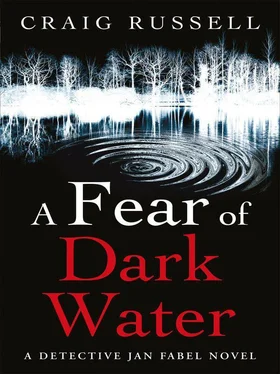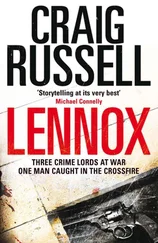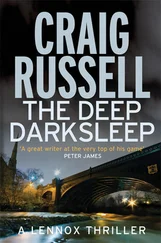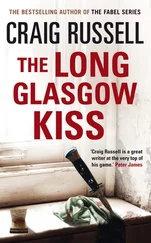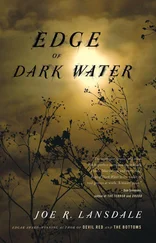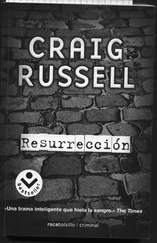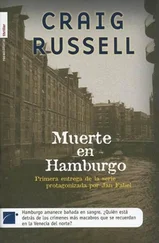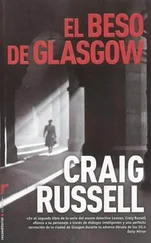Craig Russell - A fear of dark water
Здесь есть возможность читать онлайн «Craig Russell - A fear of dark water» весь текст электронной книги совершенно бесплатно (целиком полную версию без сокращений). В некоторых случаях можно слушать аудио, скачать через торрент в формате fb2 и присутствует краткое содержание. Жанр: Триллер, на английском языке. Описание произведения, (предисловие) а так же отзывы посетителей доступны на портале библиотеки ЛибКат.
- Название:A fear of dark water
- Автор:
- Жанр:
- Год:неизвестен
- ISBN:нет данных
- Рейтинг книги:5 / 5. Голосов: 1
-
Избранное:Добавить в избранное
- Отзывы:
-
Ваша оценка:
- 100
- 1
- 2
- 3
- 4
- 5
A fear of dark water: краткое содержание, описание и аннотация
Предлагаем к чтению аннотацию, описание, краткое содержание или предисловие (зависит от того, что написал сам автор книги «A fear of dark water»). Если вы не нашли необходимую информацию о книге — напишите в комментариях, мы постараемся отыскать её.
A fear of dark water — читать онлайн бесплатно полную книгу (весь текст) целиком
Ниже представлен текст книги, разбитый по страницам. Система сохранения места последней прочитанной страницы, позволяет с удобством читать онлайн бесплатно книгу «A fear of dark water», без необходимости каждый раз заново искать на чём Вы остановились. Поставьте закладку, и сможете в любой момент перейти на страницу, на которой закончили чтение.
Интервал:
Закладка:
This, thought Fabel, was more than a building. It was a statement; a dramatic statement of power and wealth. For a supposedly environmental group, it seemed to Fabel to be an aggressive statement of human dominance over Nature. And a statement not without a tone of menace.
He drove further along the narrow coastal road until he reached the end of the drive that led up to the Pharos. It was even more breathtaking close up. The lower-level module was clad in natural materials: pale wood, glass and large blocks of stone. He turned off the road and up the drive. After a short distance, Fabel came to a closed gate. There was a small blockhouse on the other side of the fence and Fabel had to give his horn a blast before anyone came out. It did not surprise Fabel to see that the young man with short cropped blond hair who emerged from the blockhouse was wearing a grey suit, white shirt and dark grey tie. He stood behind the heavy-gauge wire, regarding Fabel impassively but without making any move to open the gate.
Fabel got out of his car. He estimated that the fence that extended on either side was three metres high and heavy-duty enough to keep out any but the most determined intruder.
‘I would like to talk to Herr Wiegand.’ Fabel held up his police ID. The man at the gate remained silent and impassive. ‘Now…’ said Fabel with more emphasis.
‘No one is admitted without an appointment.’ The gatekeeper’s voice was as flat and dull as Fabel had expected. ‘We do not allow anyone access to the Pharos unless it has been arranged in advance.’
‘I don’t need an appointment. I’m the police.’ Fabel noticed that the gateman had a Bluetooth earpiece lodged in his ear.
‘Then you either need an appointment or a warrant.’
‘I don’t think you understand,’ said Fabel wearily. ‘I am here by personal invitation of Herr Wiegand. Your Director General.’
The gatekeeper continued to stare at Fabel; whatever was going through his mind certainly was not breaking the surface.
After what seemed an age, the young man broke his silence. ‘Wait here.’
He walked a few metres away and stood with his back to Fabel, who guessed the guard was communicating with the main building. After a while he came back out and opened the gate.
‘Leave your car here,’ he said. ‘We don’t allow vehicular traffic beyond this point.’
Fabel shrugged, used his remote to lock his car and stepped into the compound. The gateman led the way up to the main entrance to the Pharos where another unsmiling escort was waiting, again wearing an earpiece. Fabel examined the building from up close. It loomed. It was no accident that the Pharos Project used the symbolism and vocabulary of the world of international corporate commerce: this building was all about out-scaling everything human. Just like any multinational business’s headquarters, the Pharos had been built to embody and glorify the corporate and diminish the individual. It was the same trick that medieval cathedral architects had used, where the scale was supposed to represent God, but really was all about the power of the Church, the great multinational corporation of the Middle Ages.
Fabel was taken into a large atrium in which the lighting had been kept low. The reason, Fabel guessed, was the atrium’s centrepiece. A circle of beams, changing hue, shone upwards, illuminating what Fabel perceived as some kind of giant jellyfish, diaphanous and beautiful, with a deep red core and a skirt of transparent tentacles, suspended in mid-air. It was very well done: a holographic projection that rendered the jellyfish in three dimensions and made it pulse and change colour. But Fabel was surprised at his own reaction to the projection: for a split second it had looked so impossibly real, but Fabel had instantly, instinctively known it was an artifice.
It was as remarkable a building from the inside. As he was led through halls and corridors, and taken up to the top floor in an elevator, Fabel never lost sight of the landscape around him. No matter where he was, there was always a view through glass, even in the lift. He noticed that everyone wore the same kind of grey suit, although a minority, his escort included, were dressed in a slightly darker shade. They made their way past a host of glass-walled rooms that looked to Fabel like any other offices. Despite his escort deliberately keeping the pace up, Fabel took in as much as he could. Every room had dozens of desks with computer consoles, but of a design that Fabel had never seen before: monitors that were impossibly thin; people typing on keyboards that must have had such a low profile that Fabel could not see them. Then, as he passed a smaller office with a workstation closer to the glass wall, he realised why. The fingers of the grey-suited woman sitting at it ranged over a virtual keyboard: light projected onto the tabletop.
Fabel remembered reading about how toxic the heavy metals used in electronic hardware was to the environment. For an environmental pressure group, thought Fabel, the Pharos Project loved their gadgets. The other thing that struck him as he walked through the Pharos was how much it looked like a working office, and how the men and women he saw circulating through it did not look like cult members or mystical acolytes but more like the employees of some international bank.
Peter Wiegand was waiting for Fabel in his office; although Fabel struggled to attach the word ‘office’ to a space as vast as this. Wiegand conducted his business from the last room on the projecting top floor. The office stretched the full width of the building and was longer than it was wide. All three external walls were glass and offered views in every direction. This was where the Elbe began to open out to meet the sea and water was the element that dominated the view. Fabel noticed there was even a large rectangle of glass set into the floor, through which he could see the water rippling dark below. He made a point of stepping around the panel.
‘Please, Herr Fabel,’ said Wiegand, stepping out from behind a desk that made van Heiden’s look inadequate. ‘Don’t concern yourself. That reinforced glass is stronger than concrete; it’s entirely safe to walk on.’ He shook Fabel’s hand and led him to a chair, asking him to sit.
‘That’s a very interesting…’ Fabel struggled for the best description. ‘… piece you have in your reception. The hologram, I mean. It’s very beautiful, but an odd choice of subject. Is it because of Dominik Korn’s sub-sea history that you’ve chosen a jellyfish?’
‘I didn’t chose it. It was Dominik Korn’s inspiration. It symbolises almost everything the Pharos Project is about.’
‘Oh?’
‘The medium is the message, Herr Fabel. Dominik chose a hologram as a medium to reflect the holographic nature of the universe, that it is made up of bits of information. And, of course, that is Dominik’s great philosophy: that almost anything can be transformed into information and transferred. Stored.’
‘I wasn’t aware the universe was holographic.’ Fabel failed to keep the sneer from his tone.
‘Then you’re not acquainted with the latest discoveries in quantum physics. I’m not spouting New Age mysticism, if that’s what you think. I’m talking about the latest developments in string theory.’
‘And that’s your unique selling point, isn’t it? Digital immortality?’
Wiegand did not let his smile falter. ‘Let me ask you something: do you believe in immortality?’
‘No. Everything dies. It’s a simple law of nature, of the universe. I know that you believe we can all live for ever in a computer mainframe, but that’s not life. It’s not even existence, because it wouldn’t be real and it wouldn’t be you. You would not experience it yourself. Immortality is impossible. Everything dies.’
Читать дальшеИнтервал:
Закладка:
Похожие книги на «A fear of dark water»
Представляем Вашему вниманию похожие книги на «A fear of dark water» списком для выбора. Мы отобрали схожую по названию и смыслу литературу в надежде предоставить читателям больше вариантов отыскать новые, интересные, ещё непрочитанные произведения.
Обсуждение, отзывы о книге «A fear of dark water» и просто собственные мнения читателей. Оставьте ваши комментарии, напишите, что Вы думаете о произведении, его смысле или главных героях. Укажите что конкретно понравилось, а что нет, и почему Вы так считаете.
